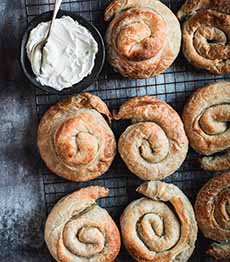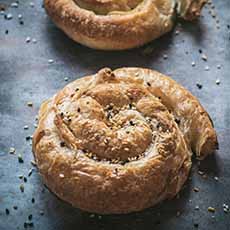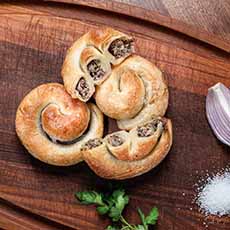TOP PICK OF THE WEEK: Balkan Bites Bureks
|
Sometimes the food adventure takes you to new countries and new cuisines. You may discover new must-have favorites. That’s what happened to us with bureks (BOO-rek, also spelled börek and other variations), when we discovered Balkan Bites, a New York-based family business that bakes bureks from generations-old recipes handed down from great-great grandmothers in Albania. (More about them below.) Bureks a Southeast European comfort foods a portable stuffed phyllo swirl. Delicate pastries made of thin, flaky hand-stretched phyllo dough, traditionally they are filled with cheese, meat or vegetables—or a combination. Modern bakers have created sweet options as well: everything from the classic cinnamon-sugar, sweetened cheese and sweetened yogurt, to Nutella. Bureks may be prepared in a large sheet pan and cut into portions after baking, like baklava; or as individual pastries. For centuries, burek had been the food of nomads and wanderers: carried in knapsacks from Beijing to Barcelona, from Modena to the Maghreb, cooked over campfires. So delicious, however, borek found its way onto the table of khans and kings. It is a culinary witness to generations of migration, conquest and displacement. Here’s more on the history of borek. Working their way into the diet of everyday folks, bureks have long been served as a popular street food, a home snack or a part of a sit-down meal. They’re part of the cuisines of the former Ottoman Empire: the Balkans* (image #8), the South Caucasus, the Levant, North Africa and other parts of Eastern Europe and Western Asia. Originally introduced by the nomadic Turks of Central Asia, the flaky phyllo swirl travelled across borders for centuries, adopting different names and shapes [source]. The Southern Slavic cuisines make derivatives of the burek. And it’s also Jewish comfort food—though not European Jewish but eastern Jewish. In the Balkans, burek is traditionally eaten with a side of yogurt or ajvar, a roasted pepper spread that goes with everything. It’s “the ketchup of the Balkans,” says Balkan Bites (you can make it or buy it online). Balkan Bites sells frozen, ready to bake bureks, in packages of four (photo #7), that make a delicious snack or an easy meal for the whole family. Frozen bureks last for one year in the freezer. At Balkan Bites, everything is made from scratch. The phyllo dough uses unbleached flour, extra virgin olive oil, real butter “and a lot of love, says Balkan Bites.” “We believe in simple, high-quality ingredients and we never use palm oil, soybean oil, or margarine.” We pop one into the oven for a snack, or heat more for a meal of different flavors of burek. It’s easy cut them in half and share the flavors. While the top of the börek is occasionally sprinkled with sesame or nigella† seeds, or both (photo #3). But Balkan Bites expands the traditional menu with these combinations: Please note that if you search online, there’s a London company with the url BalkanBites.COM. This is BalkanBites.CO. ________________ *The Balkans is a geographic area that lies on the southeastern edge of Europe. Known for its diverse cultures, traditions, and ethnicities, it is the shared love of food, like the Burek, that brings people together. †Nigella seeds are often incorrectly referred to as black caraway, black cumin, fennel flower and onion seeds, among others. However, nigella (kalonji in Hindi) is none of these. While it is not an aromatic spice—it has just a hint of savory scent—it is very flavorful. Nigella seeds have an oregano-like quality with herbaceous notes, a slight bitterness and a warm, toasted-onion flavor. They are as adaptable as most spices. Add them salads, sauces and as a garnish for soups and other foods [source]. |
|
|
|
|
||









